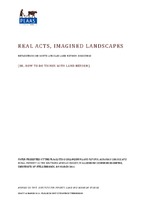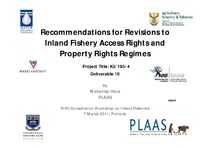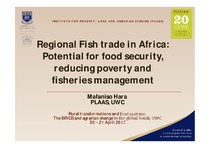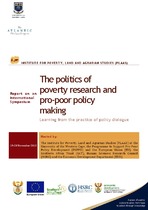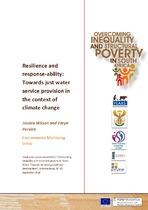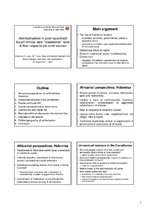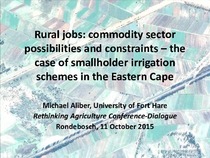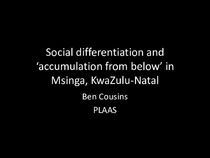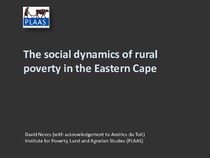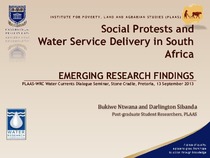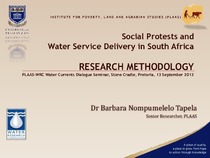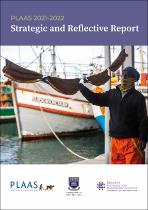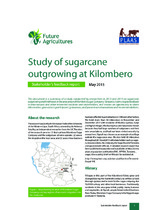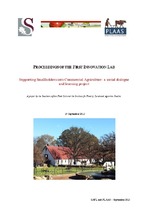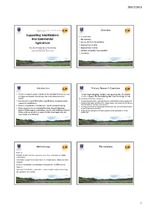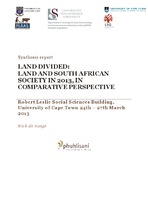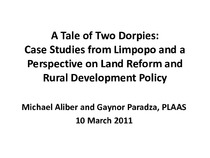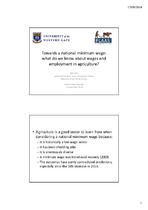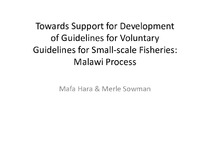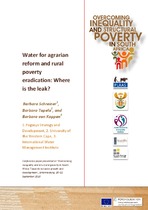Browsing Conference Papers and Reports by Title
Now showing items 47-66 of 71
-
Real acts, imagined landscapes
(Institute for Poverty Land and Agrarian Studies (PLAAS), 2011)Why do we want land and agrarian reform? Why should its policies be supported? Much can be said about its stated purposes and goals, but why do those goals matter — and to whom? If, as James Ferguson remarked earlier in ... -
Recommendations for revisions to inland fishery access rights and property rights regimes
(2011)• Deliverable Aims: • Evaluate and analyse existing property rights and access rights currently governing inland fisheries in South Africa • Recommend reforms or changes to the existing property rights regimes and access ... -
Regional fish trade in Africa: Potential for food security, reducing poverty and fisheries management
(2015)Sub-Saharan Africa: context • One of the regions in the world suffering from high rates of hunger and poverty. • 26% of the world’s hungry people were located in sub-Saharan Africa in 2010 (FAO and WFP,2010) • Chronic ... -
Report on an international symposium: The politics of poverty research and pro-poor policy making: Learning from the practice of policy dialogue
(Institute for Poverty Land and Agrarian Studies (PLAAS), 2012) -
Resilience and response-ability: Towards just water service provision the context of climate change
(Institute for Poverty Land and Agrarian Studies (PLAAS), 2010)Climate change will impact on water service provision, yet it is not integrated into water sector policies and plans. This paper unpacks some of the reasons for this disjuncture: the complex and overwhelming challenge of ... -
Retribalisation in post-apartheid South Africa: new “traditional” laws & their impacts on rural women
(2011)• The rise of traditional leaders – in political, economic, governmental, judicial & legislative terms – amounts to a modern, post-apartheid retribalisation of the countryside • Deleterious effect on rights • Roots of ... -
Rural jobs: Commodity sector possibilities and constraints – the case of smallholder irrigation schemes in the Eastern Cape
(2015-10-10)• NDP – 1 million new jobs in agriculture; largely premised on expanding the area under irrigation • Cousins – “The evidence from Tugela Ferry and other irrigation schemes shows that where [small-scale farmers] have ... -
Social differentiation and ‘accumulation from below’ in Msinga, KwaZulu-Natal
(2014)South Africa has a highly unequal distribution of agricultural land > hence land reform BUT Who should be the primary beneficiaries of redistributive land reform? How can land redistribution address the structural ... -
The social dynamics of rural poverty in the Eastern Cape
(2017)Overview • Structural poverty & its causes • Understanding impoverished livelihoods : i. Social grants ii. Informal economic activity • Social dynamics • ‘Informal social protection’ • The downside of ‘social capital’ -
Social protests and water service delivery in South Africa
(2013-09-13)• To identify the key drivers of water-related social protests, roles of organization and mobilization and dynamics of perceived deprivation. -
Social Protests and Water Service Delivery in South Africa
(2013-09-13)To develop: • Clear understandings of the linkage between social protests and water service delivery. • An evaluation framework to enable government, municipalities and other stakeholders to more effectively address ... -
Strategic and Reflective Report: PLAAS 2021-2022
(Institute for Poverty, Land and Agrarian Studies: PLAAS, 2022)This biennial report offers an account of PLAAS during a time of challenge and transition. If 2020 was the Year of the Pandemic, then 2021-2022 ushered in the Years of the New (ab)Normal. In 2020, attention was almost ... -
Study of sugarcane outgrowing at Kilombero
(Institute for Poverty Land and Agrarian Studies (PLAAS), 2015) -
Supporting smallholders into commercial agriculture: A social dialogue and learning project
(Institute for Poverty Land and Agrarian Studies (PLAAS), 2013)The Southern Africa Food Lab (SAFL) and the Institute for Poverty, Land and Agrarian Studies at the University of the Western Cape (PLAAS) are engaged in a project called Supporting Smallholders into Commercial Agriculture: ... -
Supporting smallholders into commercial agriculture: The role of private sector partnerships
(2016-07-25)• SSCA is a research project started by the Institute for Poverty, Land and Agrarian Studies (PLAAS) and the South Africa Food Lab (SAFL). • Commenced in April 2012 with a specific focus on private sector support to ... -
Synthesis report: Land divided: Land and South African Society in 2013, in comparative perspective
(Institute for Poverty Land and Agrarian Studies (PLAAS), 2013)Three institutions, the Centre for Law and Society at the University of Cape Town, the Department of Sociology and Social Anthropology at the University of Stellenbosch and the Institute for Policy, Land and Agrarian Studies ... -
A tale of two dorpies: Case studies from Limpopo and a perspective on land reform and rural development policy
(Institute for Poverty Land and Agrarian Studies (PLAAS), 2011)“Rural development is about enabling rural people to take control of their destiny, thereby dealing effectively with rural poverty through the optimal use and management of natural resources” (MRDLR 2009:14). -
Towards a national minimum wage: what do we know about wages and employment in agriculture?
(2014)• Agriculture is a good sector to learn from when considering a national minimum wage because: – It is historically a low-wage sector – It has been shedding jobs – It is enormously diverse – A minimum wage was introduced ... -
Towards support for development of guidelines for voluntary guidelines for small-scale fisheries: Malawi process
(2015)• Malawi used as case to support development of the guidelines • One of a number of cases worldwide -
Water for agrarian reform and rural poverty eradication: Where is the leak?
(Institute for Poverty Land and Agrarian Studies (PLAAS), 2010)The distribution of water use is undoubtedly the sharpest inequality inherited from the past in South Africa, with a Gini Coefficient of 0.96 and higher. Unfortunately, as the review in this paper suggests, the gap is even ...

